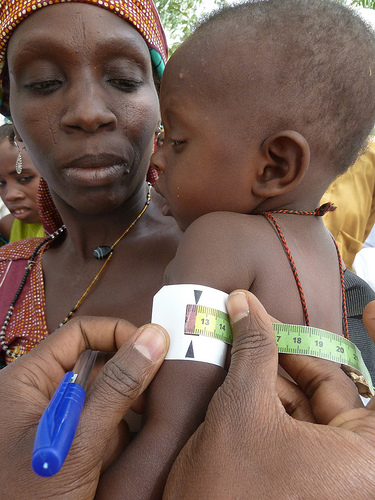 In September, the UN Food and Agriculture Organization warned of the potential for severe food shortages in the conflict-affected northern states of Nigeria. The European Commission’s Humanitarian Office (ECHO) estimates that 2.1 million people in the region are currently in need of emergency food assistance while another 3 million are at risk due to growing food insecurity concerns.
In September, the UN Food and Agriculture Organization warned of the potential for severe food shortages in the conflict-affected northern states of Nigeria. The European Commission’s Humanitarian Office (ECHO) estimates that 2.1 million people in the region are currently in need of emergency food assistance while another 3 million are at risk due to growing food insecurity concerns.
Growing instability in the region has caused acute malnutrition in nearly 1.4 million of the region’s children under the age of five, with nearly 500,000 of these children requiring emergency life-saving assistance. “The difficulty is that many children cannot be reached. The response to the food crisis is low compared to the level of the crisis,” said Cyprien Fabre, the West Africa head of ECHO.
Boko Haram, an Islamist militant group, has terrorized this region since early 2012 in an effort to forcibly establish an Islamic state independent from the rest of Nigeria. The resulting instability in the region has caused seed, fertilizer, tool and money shortages. Violence has also forced approximately 20,000 farmers off of their land, leaving no one to tend them. As a result, a large portion of the regions crops have been left to rot and be eaten by animals.
“I so much want to go back and cultivate, but I’m concerned for my safety. Even if I go back, the major problem I will encounter is lack of planting seeds and fertilizer, which I don’t have money to buy” said the farmer Bukar Ngamdu. Another farmer, Ahmad Bura, explained “we have lost this farming season, and we are not sure we are going to have the opportunity of planting next season due to the insecurity… We have turned from food growers to food beggars.”
Even those farmers who have managed to produce crops encounter extreme difficulties in transporting their food to local markets. To get food from the farm to local consumers, farmers must pass roadblocks and checkpoints where they pay hefty bribes or face the threat of attack. Additionally the northeastern states of Borno, Yobe and Adamawa have been in a state of emergency that has kept them cut off from the rest of the country. With only limited access to local or imported foods, people in this region face a severe food shortage.
This situation has also begun to affect the rest of the country, leading to skyrocketing food prices. With food availability dwindling and prices rising, food insecurity now affects over 65% of Nigeria’s population of 160 million people.
Creative Commons Love: DFID – UK Department for International Development on Flickr.com
Written by Amanda Lubit